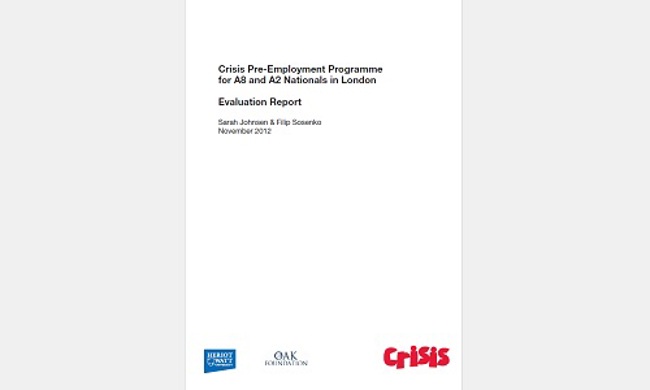Crisis Pre-Employment Programme for A8 and A2 Nationals in London Evaluation Report (2012)
01.11.2012
Homelessness and destitution amongst migrants have been elevated in the policy agendas of many European countries in recent years. In the UK, as elsewhere, there has been particular concern about the welfare of migrants from Central and Eastern Europe (CEE), most notably Accession 8 (‘A8’) and Accession 2 (‘A2’) nationals since their countries of origin joined the European Union (EU). The overwhelming majority of CEE migrants successfully obtain employment and accommodation in the UK, but welfare entitlement restrictions mean that options have been very limited for the minority who find themselves without paid employment.
Key findings
- The Crisis Pre-employment Programme for A8 and A2 nationals in London was set up in response to a dramatic increase in the proportion of CEE migrants within the street homeless population in London and the failure of existing services to provide them with adequate advice regarding their rights and entitlements in the UK. The programme is based on the premise that paid employment offers an important route out of homelessness and potential destitution. It thus aims to support CEE migrants by improving the skills and employability of those who are homeless or at risk of homelessness in the capital.
- The programme was funded by the Oak Foundation and has been independently evaluated by Heriot-Watt University. The programme offers tailored one-to-one support, delivered by job coaches, who typically meet with service users once or twice per week. It also facilitates access to a range of on-site training courses, and/or supports users to access training elsewhere as appropriate. Additional forms of support include a job club, mock interviews and financial assistance for travel, clothing or equipment necessary to enhance users’ employability. Job coaches also regularly support users in areas that are not directly related to employment, such as facilitating access to housing or health services and/ or assisting with welfare benefit applications (where applicable).
- The programme ran from October 2009 until September 2012, during which time it supported 398 service users. The vast majority have been men, most commonly in the 25-44 age bracket. Most (82%) of the programme’s service users were from A8 countries; 18% were A2 nationals. More specifically, Polish nationals comprised the largest proportion of participants, followed by Lithuanians, Romanians, Czechs and Latvians.
- More than half of all service users were sleeping rough, and almost all others living in temporary or insecure housing (most commonly squats), at the point of recruitment. The vast majority were economically inactive, in that they were unemployed and not involved in training or education at that point. Self-reports of multiple vulnerabilities were relatively uncommon, but staff reported that a minority of CEE migrants are highly vulnerable, often because of alcohol misuse issues.
- In total, 40% of service users acquired one or more jobs after becoming involved with the programme, thus the programme’s employment acquisition outcome target (of 37%) was exceeded. Job retention proved difficult to measure, but the data available suggests that approximately half (49%) of service users sustained employment for at least six months. The programme thus did not quite meet its 55% job retention target, but its failure to do so should not be given undue prominence given challenges encountered in measurement, most notably difficulties in maintaining contact with service users who had obtained a job or returned to their country of origin.
Reference
Johnsen, S. & Sosenko, F. (2012) Crisis Pre-Employment Programme for A8 and A2 Nationals in London. London: Crisis.

